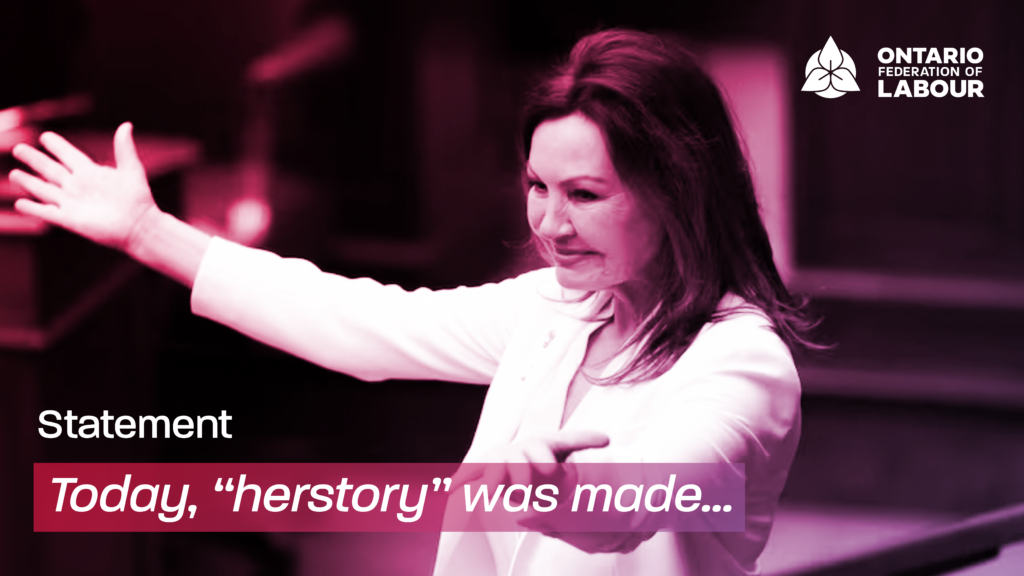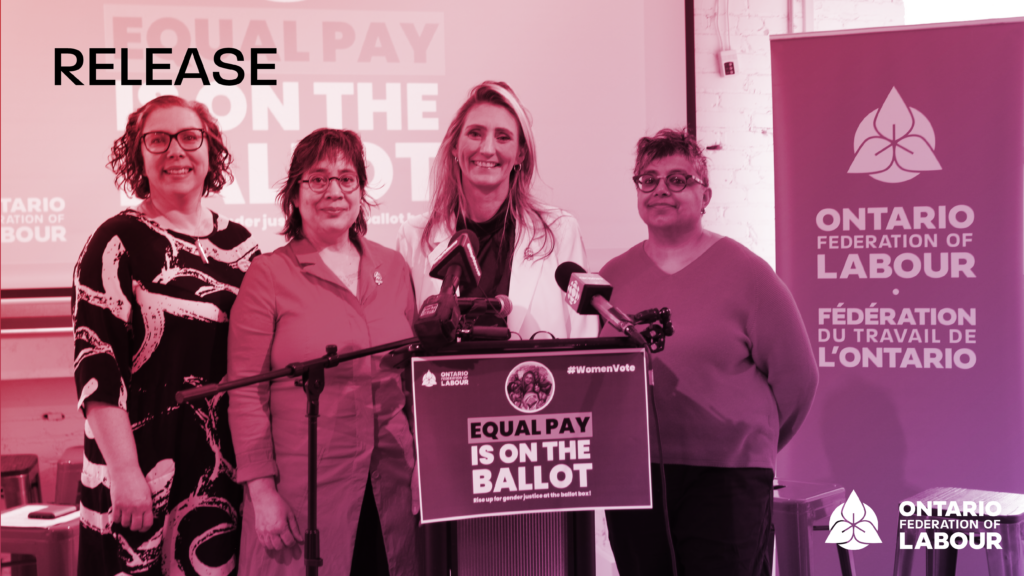The Occupational Disease Reform Alliance (ODRA), made up of occupational disease clusters throughout Ontario, is calling on the Ford Government to fix the broken Workplace Safety and Insurance Board (WSIB) system for widows, workers and communities.
See below for more details on the exposures, diseases and barriers each cluster faces – and why they are demanding immediate action from Minister of Labour Monte McNaughton and the WSIB.
Chemical Valley – SARNIA, ON:
What’s the issue? Sarnia – known as Chemical Valley – could be seen as Canada’s occupational disease capital and heart of the petrochemical industry. According to a 2011 World Health Organization report, the city has the most polluted air in the entire country. There is not just one disease cluster in Sarnia; tragically, there are several. First came rampant asbestos exposures in a local foundry, which caused asbestos-related cancers amongst workers. Then came another cluster from a fibreglass factory, with exposures to the “Dirty Dozen” substances, including asbestos, toxic chemicals, and silica. And many more exposures and diseases followed. Workers in Sarnia have suffered much more than the Canadian average from a wide range of cancers and other diseases, including Canada’s highest rate of mesothelioma – an aggressive cancer inextricably linked to asbestos exposure. In the middle of the 100 city block radius of industry, sits a First Nations reservation called Aamjiwnaang – an over-polluted and under-researched community impacted by decades of industrial pollution of the air, water, and land. Workers and community members continue to ask questions and seek justice decades later.
“What is your life worth? My husband would not have been asked this question when he interviewed for a position at the Sarnia Fibreglass factory and truthfully it likely never crossed his mind until he became sick.
Bud Simpson was a 36 year employee for Fibreglass Sarnia when the plant closed in 1991. Within six months of the plant closing he became sick. His diagnosis was nasopharyngeal and gastrointestinal cancer that metastasized to the brain. With CT scans, 110 radiation treatments on his head, losing all his teeth being fed through a feeding tube, and talk of removing his nose, I could never have imagined that WSIB would wage war against my family for so long. They have been unrelenting in their pursuit to deny that his workplace exposures caused his illness and ultimately his death. I fear that my husband’s WSIB claim will outlive me.
I recently heard that WSIB refunded employer contributions in the millions of dollars. How can this be allowed to happen when my husband’s claim and others like his go unresolved? I want Justice for Bud & myself and I don’t want others to suffer and go through the trauma this broken system has put me through for the past 20+ years.”– Jean Simpson, wife of Bud Simpson
General Electric – PETERBOROUGH, ON:
What’s the issue? General Electric was the lifeblood of Peterborough, Ontario – housing almost 6000 workers in its heyday. The plant was infamous for building small to large A/C and D/C motors and generators, power conversion panels, and nuclear fuel bundles. But it also housed asbestos, forty known carcinogens, and 3000 chemicals – exposures that widows, workers, and their advocates took years to document retrospectively. Workers describe the “snowstorm of asbestos” in the plant, the chemical taste in their coffee, and the “GE smell” of loved ones coming home. According to data collected by the Canadian Broadcasting Corporation (CBC), Peterborough has a 40% higher rate of mesothelioma compared to the provincial average. Almost 700 former General Electric employees or their families filed an occupational disease claim with the Workplace Safety and Insurance Board (WSIB). Of these, around one third were compensated. The other two thirds are still in limbo, and demanding justice now.
“My husband worked at GE Peterborough for 42 years and died from Occupational Disease on August 17, 2014. He had just nicely retired when he was diagnosed with esophageal cancer and passed away in two weeks. It was never about the money; who cares about the money. All I ever wanted was to have my husband back, enjoying our retirement, watching his girls grow into beautiful women, walking them down the aisle, seeing his first grandchild. GE took that from him at an early age. I was desperately hoping for closure, which I don’t have because of the fight I have had to endure, while trying to grieve my husband and the absence of their dad in my girls’ lives.”
– Sara Sharpe, GE widow
Where can I find more information? https://www.cbc.ca/cbcdocspov/episodes/town-of-widows
Who should media contact? Sue James, suejames@cogeco.ca
Paper Mill (RB4) – DRYDEN, ON:
What’s the issue? In 2002-2004, hundreds of construction workers were required to work on a major project at a paper mill while the mill continued to operate. The extensive fumes from the paper mill stack often engulfed the construction worksite, exposing these workers to a chemical soup of toxic substances (e.g. carbon monoxide and hydrogen sulphide). Sometimes dozens of them went to the hospital with resulting symptoms (headache, fatigue, weakness, impaired coordination, mood and personality change). In the years since, a range of complex health conditions have affected many of these workers. Very few of the cases have been recognized by WSIB.
“The once sharp and quick-witted man was now suffering from memory loss and brain fog. His energy for work had been replaced with crippling headaches, daily battles with gastrointestinal problems and a constant battle with tinnitus. During his time he was exposed to numerous chemicals and forced to breathe them in until a tester could arrive, sometimes taking 4 hours. Twice during the 7 month project Jim passed out, woke up to find himself in an oxygen mask and was quickly sent back to the workplace. Not only is Jim forever forced to deal with the aftermath of the unsafe working conditions at Dryden Mill, so too does his family have to adapt. Jim described how the aftermath has added significant stress and strain on his spouse. Unable to leave his house without a caregiver and unable to drive because of his onset of seizures, taking care of her husband became a full-time job for Jim’s wife for several years.”
– Jim Littleford
Where can I find more information? https://thunderbayinjuredworkers.com/dryden-mill-story/
Who can media contact? drydenrb4@gmail.com
Steel Mills – SAULT STE MARIE, ON:
What’s the issue? Cluster focuses on the Steel Mill workers in Sault Ste Marie, a small percentage of workers in the Cluster also worked at the Ore Mine in Wawa. Since 2007 USW has filed approximately 1300 Occupational Disease Claims (not including Noise Induced Hearing Loss); of those approximately 1300 WSIB has only allowed 28-32%. Due to the nature of the work at the Steel Mill and Ore Mine, there are multiple exposures for workers however WSIB has not been consistent with recognizing the effects of multiple exposures in the adjudication process.
Where can I find more information? http://www.usw2251.ca/occdiseasehome.php
Who can media contact? Mike Da Prat, USW Local 2251 President, 705-942-3900, pres2251@usw2251.ca
Rubber Workers – KITCHENER-WATERLOO, ON:
What’s the issue? The Kitchener-Waterloo Rubber Workers Cluster first came to light in 2002 when USW Local 677 ran an occupational disease clinic for all plants involved in the local rubber industry. That led to about 800 claims being filed, many for cancer. When the BF Goodrich plant closed in 2006, the files were turned over to the Office of the Worker Advisor for advice and representation. In 2018, Greg Mercer of the Waterloo Regional Record did several stories about people who were denied WSIB or still awaiting decisions. Combined with another clinic held in March 2019, this put pressure on WSIB to reopen these files. The agency decided to re-examine approximately 300 claims. They ended up accepting only another 31. Workers understood that new evidence from Dr. Demers’ report would affect the remaining claims, although it was released in January 2020 nothing has happened.
“Virginia wonders what hidden role that exposure played in the lives of their children. Their daughter Paula died of leukemia in 1987; a tumour was discovered in son Robert’s throat after his death as an infant in 1966. ‘How do I know that the cancer wasn’t from me washing his clothes, and they got it?’ she said. ‘We didn’t know anything about cancer then, because that was a long time ago.’ By 2003, Ross was fully involved in a fight with cancer. His retirement vanished in a blur of radiation treatments, endless hospital visits and unexplained illnesses. He died in November 2007.”
– Ross Mackenzie started at BFGoodrich, his widow Virginia, says he was regularly exposed to lamp black, cadmium and asbestos.
Where can I find more information? https://www.therecord.com/news/waterloo-region/2018/11/23/rubber-town-kitchener-s-rubber-industry-once-employed-thousands-for-many-former-workers-and-their-families-the-legacy-of-those-jobs-has-been-illness-disease-death-and-poverty.html?rf
Who can media contact? Sylvia Boyce, USW District 6 Safety, Health and Environment Coordinator, 905 741-9830
Gord Assman, President SOAR Chapter 80, 519 590-2158
Pebra/Ventra Plastics – PETERBOROUGH, ON:
What’s the issue? It was originally a German firm that established a factory in Kitchener (1981) followed by a second factory in Peterborough (1986). In 1998 it was purchased by Ventra, the current owner. The plant’s first decade was marked by strikes and work refusals – as one MOL inspector described “… It has been a rocky road” to the workers achieving coverage under the Ontario Health and Safety Act. By the mid 1990s workers at the plant were concerned by the number of co-workers diagnosed with serious illness or disease, including cancers, respiratory problems, chronic/critical cardiovascular issues, reproductive problems, and neurological concerns. In 2020, a group of current and retired workers met weekly for five months to retrospectively document their chemical work exposures which culminated in a 255-page report entitled “We Can’t Breathe” – A Retrospective Exposure Profile of the Pebra Inc. Plastics Plant in Peterborough, Ontario (1986-1996), funded by The Occupational Health Clinics for Ontario Workers (OHCOW). The report provides detailed information to challenge the many denied worker claims to date, and support future WSIB claims filed by Ventra workers. The information contained has relevance for workers in other plastic plants in preparation of occupational disease claims.
“My partner Kathy Byrd worked at Pebra/Ventra for approximately 20 years when she was diagnosed with kidney and liver cancer. She fought for 7 ½ months before she succumbed to her illness leaving behind 2 beautiful young daughters for me to raise on my own. Kathy’s claim for WSIB was denied and I am in an appeal at this time. This February will be 8 years of fighting for compensation. Her daughter’s deserve to be compensated for growing up without a mother. To get married and plan a wedding alone. To have children and no grandmother to share the joy. Compensation needs to recognize occupational illness and do the right thing!”
– Brian McFadden
“The day of John’s Passing, I had accompanied him to his room for his usual rest. He was very restless, like he knew his time was near. He spoke of the conversations he had had with Lorna that very morning and reminded me to keep reminding her of his desire to see Gavin taken care of and to continue his work place battles for those that had, and were suffering to continue. It was deeply felt by him to say that. I should know because he passed just hours later. I was holding him.”
– Dan Nicholson
Where can I find more information? https://www.ohcow.on.ca/occupational-illness/occupational-disease-cluster-investigations/ventra-pebra-plastics-cluster-project/
Who can media contact? Rose Wickman, Past (28 year) president, UNIFOR Local 1987, roseforestell@yahoo.ca, 705-778-1869
Jackie Dufty, Present Health and Safety Rep. UNIFOR Local 1987
Neelon Castings – SUDBURY, ON:
What’s the issue? Foundry casting operations at Neelon Castings used and produced very large amounts of toxic and carcinogenic compounds. Broadly speaking, these chemicals are rated as: known or suspected cancer causing agents for various organ sites; chemicals that irritate the respiratory tract and cause various respiratory diseases including chronic obstructive pulmonary disease (COPD) as well as silicosis, lung cancer, and sarcoidosis; chemical groups such as endocrine disruptors known to disrupt the hormonal and reproductive systems; as well as chemicals that can cause cardiovascular diseases and blood disorders, in addition to neurological diseases and gastrointestinal disorders and cancer. Workers were heavily exposed to many of these chemicals due to the large amounts handled, very poor exposure controls, excessive hours of work at 48 to 60 hours per week, and rigorous work regimes with high heat stress and excessive noise levels. Carbon monoxide levels, for example, were so severe that workers fell asleep at their workstations, and sometimes, at the wheel of their cars on their way home from work. Refractory workers building and repairing ladles and furnace refractory materials were exposed to extremes of heat and high concentrations of carcinogenic fibres and dust in confined spaces. Dust levels were so high that workers could not be seen inside the furnace, and heat so high that it burned through the soles of their work boots.
Wilf was a millwright and mechanic employed by Neelon Casting for 28 years. His job duties took him all over the foundry exposing him to various chemicals and toxins. Wilf retired on his sixtieth birthday in June of 2014 and was diagnosed with esophageal cancer in February of 2016. He passed on July 1st 2016. Wilf was a devoted husband, father and according to his grandchildren “the best papa”. Mrs. Robichaud recalls asking her husband why he continued to go to work in such a toxic and dirty work environment because she can remember a very distinctive smell coming from his skin even after he showered. Mr. Robichaud would respond that he was doing his best to provide for their family and put food on the table. Mr. Robichaud died at the age of 62 years old from what his family is certain was caused by the working conditions of The Neelon Casting Foundry. Mrs. Robichaud lost her husband and their children lost their father and their grandchildren lost “the best papa” and they are waiting for justice and recognition from the WSIB.
Where can I find more information? https://www.ohcow.on.ca/occupational-illness/occupational-disease-cluster-investigations/neelon-castings/
Who can media contact? Sylvia Boyce, USW District 6 Safety, Health and Environment Coordinator, 905 741-9830
Jessica Montgomery, USW Local 2020 WSIB Worker Rep., 705-675-2461 ext. 228, jmontgomery@uswsudbury.ca
Further Information
Below is a list of just some of the public information that has been made available to the Minister of Labour, Training and Skills Development by those affected:
- Occupational Health Clinics for Ontario Workers Inc., Occupational Disease Cluster Investigations
- 2019, The Demers Report to the Min. of Labour entitled Using scientific evidence and principles to help determine the work relatedness of cancer
- 2020 Operational Review of the WSIB by Speer and Dykeman
- CBC Documentary, Town of Widows


